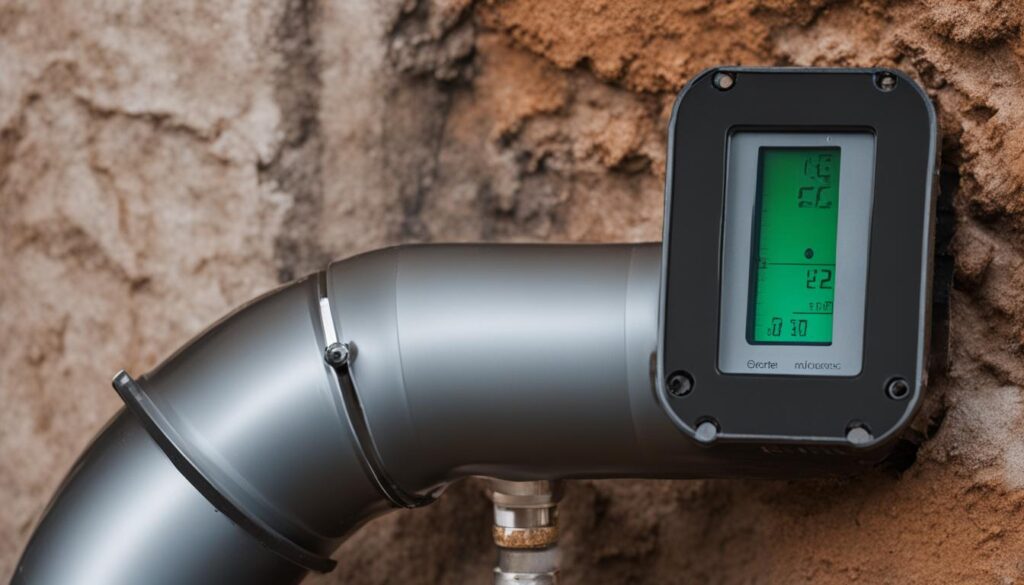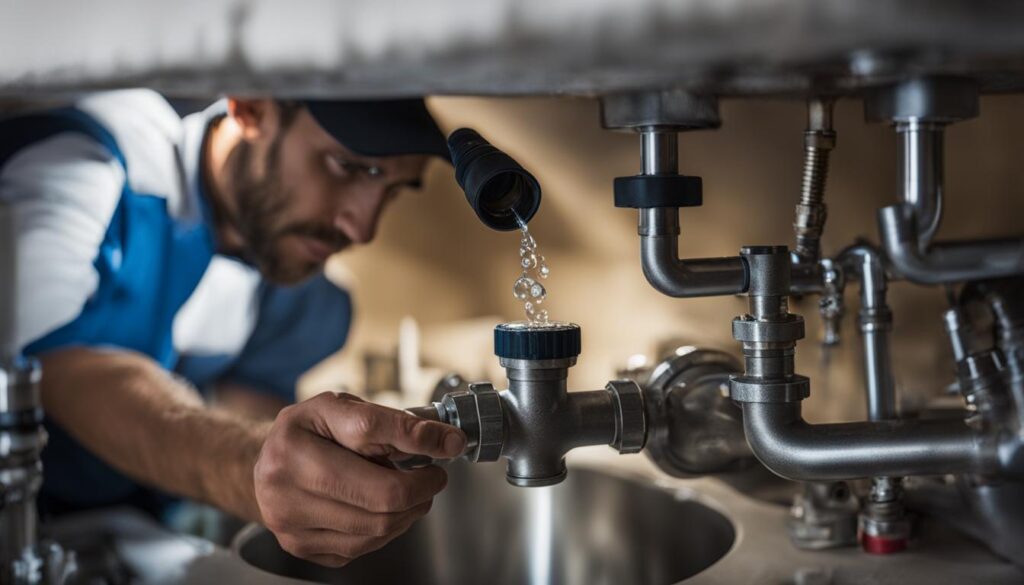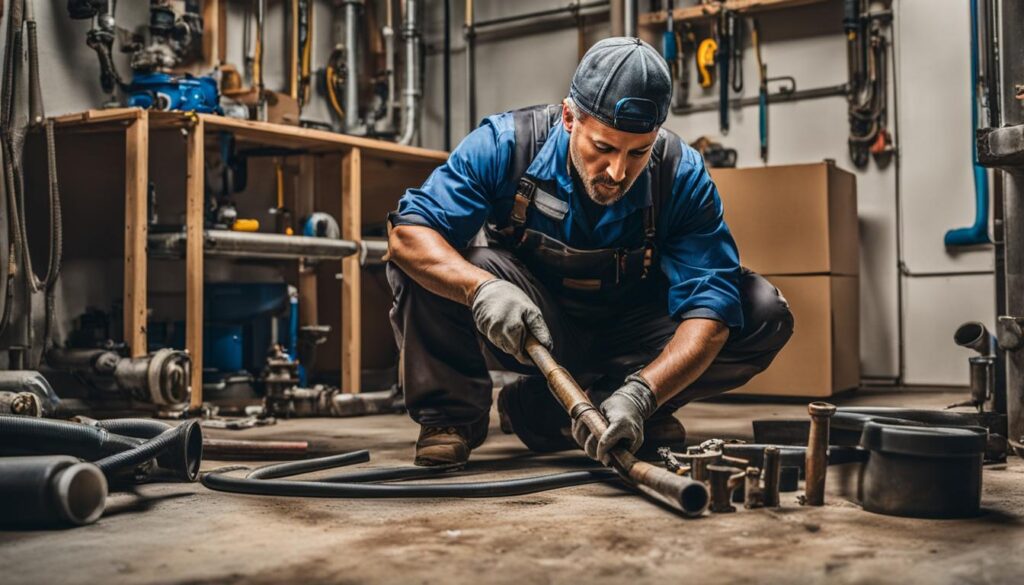Are you dealing with a plumbing leak in your home? Don’t wait! Taking immediate action to fix a plumbing leak is essential. Even small leaks can lead to significant damage and cause a range of issues such as mold growth, structural damage, health problems, water contamination, burst pipes, fire hazards, and higher utility bills. In this article, we will provide you with expert tips and advice to help you detect and fix water leaks promptly, preventing further damage and costly repairs.
Key Takeaways:
- Water leaks can cause extensive damage and pose various risks to your home.
- Early detection and prompt repair are crucial to prevent further damage.
- Signs of a water leak include increased water bills, musty smells, stains or condensation on walls or ceilings, and the sound of running water when everything is turned off.
- Regular maintenance and prompt repair can save you from costly repairs and ensure the integrity of your home’s plumbing system.
- If detecting a water leak becomes challenging, it’s best to call a professional plumber who has the expertise and tools to locate and fix the leak effectively.
The Dangers of a Water Leak
A water leak in your home can lead to a multitude of dangers and damages that should not be taken lightly. The consequences of ignoring or neglecting a water leak can be far-reaching and costly. From water damage restoration to plumbing repair, it is crucial to address water leaks promptly to protect your home and your health.
One of the major risks associated with water leaks is the potential for mold and mildew damage. When moisture is present, mold spores can quickly grow and spread, causing not only physical damage to your belongings but also potential health issues for you and your family. Mold exposure can lead to respiratory problems, allergies, and even more severe health conditions.
Additionally, water leaks can cause structural damage to your home. The continuous presence of water can weaken walls, ceilings, and floors, compromising the integrity of your home’s structure. This can lead to costly repairs and even jeopardize the safety of your living space.
Furthermore, a water leak can contaminate your household water supply. If the leak is from a pipe or fixture connected to your main water source, it can introduce harmful substances into your tap water. This can pose a serious health risk, especially if consumed or used for cooking, cleaning, or bathing.
The Dangers of a Water Leak:
- Mold and mildew damage
- Moisture-related structural damage
- Health issues due to mold exposure
- Household water contamination
- Compromised safety of your home
It is essential to prioritize water leak detection and take immediate action to repair any leaks. By addressing water leaks promptly, you can prevent further damage, protect your home and loved ones, and avoid costly repairs in the future.

How to Detect a Water Leak
Detecting a water leak is crucial for preventing further damage and costly repairs. By identifying the signs of a leak early on, you can take swift action to fix the plumbing issue. Here are some key steps to help you detect a water leak:
- Check your water meter: Start by checking your water meter. Make sure all water sources in your home are turned off. If the meter continues to run or shows any activity, it could indicate a leak.
- Inspect visible pipes and fixtures: Look for any visible signs of leaks in pipes, faucets, showerheads, and toilets. Check for puddles of water, dampness, or discoloration on walls, ceilings, or floors. Don’t forget to check underneath sinks and cabinets as well.
- Listen for unusual sounds: If you hear the sound of running water when no faucets or appliances are in use, it may indicate a hidden water leak. Pay attention to any hissing or dripping sounds that could be coming from pipes or plumbing fixtures.
- Use food coloring: To check for toilet leaks, add a few drops of food coloring to the toilet tank. If the color appears in the bowl without flushing, it suggests a leak in the toilet’s flapper valve or overflow tube.
- Monitor your water bill: Keep an eye on your water bill for any significant increases. If your bill suddenly spikes without any changes in water usage, it could be a sign of an undetected water leak.
- Consider a leak detection device: There are various leak detection devices available on the market that can help you locate hidden leaks. These devices use sensors to detect moisture and alert you to potential leaks.
Remember, a small water leak can quickly escalate into a major problem if left untreated. If you suspect a leak but are unable to locate it, it’s best to call a professional plumber for assistance. They have the expertise and specialized tools to accurately identify and repair water leaks.

Table: Common Signs of a Water Leak
| Signs of a Water Leak | Description |
|---|---|
| Increased water bills | Unexpected rise in water usage and billing |
| Musty smells | Moldy or damp odors in certain areas of your home |
| Staining or condensation | Visible water stains or condensation on walls, ceilings, or floors |
| Sound of running water | Hearing water flow or dripping sounds when water sources are off |
Being proactive in detecting water leaks can save you from costly repairs and mitigate potential water damage. Regularly inspecting your plumbing system and taking prompt action when leaks are detected will help ensure the integrity and efficiency of your home’s water supply.
How Plumbers Find Water Leaks
When it comes to detecting and fixing water leaks, it’s best to call in the professionals. Plumbers have the knowledge, experience, and tools to accurately locate and repair leaks, preventing further damage to your home. Here are some of the methods that plumbers use to find water leaks:
Acoustic Technology
Plumbers often use acoustic technology to pinpoint the source of a water leak. This method involves using special microphones and headphones to listen for the sound of water where it shouldn’t be. By carefully listening to the pipes and surrounding areas, plumbers can identify the exact location of the leak without having to tear up walls or floors.
Thermal Leak Detectors
Another effective method used by plumbers is thermal leak detection. This involves using thermal imaging scanners to identify small temperature differences that indicate the presence of moisture. By scanning the affected areas, plumbers can quickly locate leaks behind walls, under floors, or in other hidden areas. This non-intrusive technique saves both time and money in locating and repairing water leaks.
Video Inspection
In some cases, plumbers may need to visually inspect the pipes to find hidden leaks. This is done using waterproof cameras that are inserted into the plumbing system. The cameras provide real-time footage of the pipes, allowing plumbers to identify any signs of leaks, corrosion, or other issues. Video inspection is particularly useful for detecting leaks in hard-to-reach areas or complex plumbing systems.
Calling a professional plumber to handle water leak detection and repair ensures that the job is done correctly and efficiently. Plumbers have the expertise and specialized tools to identify leaks accurately and provide the necessary repairs. By addressing water leaks promptly, you can prevent further damage to your home and save money on potential repairs down the line.

| Method | Description |
|---|---|
| Acoustic Technology | Listening for the sound of water using special microphones and headphones. |
| Thermal Leak Detectors | Detecting small temperature differences that indicate the presence of moisture using thermal imaging scanners. |
| Video Inspection | Using waterproof cameras to visually inspect the plumbing system for signs of leaks or other issues. |
Conclusion
Fixing a plumbing leak is essential to prevent further damage and costly repairs. Whether you choose to handle the repair yourself or seek the assistance of a professional plumber, addressing leaks promptly is crucial to avoid mold, structural damage, health issues, and high utility bills.
Regular maintenance and prompt repair not only save you from more extensive damage but also ensure the integrity of your home’s plumbing system. By taking swift action, you can safeguard your property and protect your family from the hazards associated with leaking pipes.
Remember, when it comes to emergency plumbing situations, it’s always better to be safe than sorry. Don’t hesitate to contact a reliable plumber if you encounter a water leak that requires professional expertise. They have the necessary tools and knowledge to diagnose and fix even the most elusive leaks, preventing further complications down the line.
FAQ
What are the dangers of a water leak?
Water leaks can lead to mold and mildew damage, structural damage, health issues, water contamination, burst pipes, fire hazards, and higher utility bills.
How can I detect a water leak?
Signs of a water leak include increased water bills, musty smells, staining or condensation on walls or ceilings, and the sound of running water when everything is turned off. Checking faucets, showerheads, water-based appliances, looking for stains or moisture, and checking the water meter can help identify leaks.
How do plumbers find water leaks?
Plumbers use various methods to find water leaks, such as acoustic technology, thermal leak detectors, and video inspection. Acoustic technology involves listening for the sound of water using special microphones and headphones. Thermal imaging scanners detect moisture by identifying temperature differences. Video inspection involves using waterproof cameras to inspect pipes.
Should I fix a plumbing leak myself or call a professional?
It depends on the severity and complexity of the leak. Small leaks may be fixable by homeowners, but difficult or extensive leaks are best handled by professional plumbers to prevent further damage.
Why is it important to fix a plumbing leak promptly?
Fixing a plumbing leak promptly is crucial to prevent mold, structural damage, health issues, and high utility bills. Regular maintenance and prompt repair can save you from more extensive damage and ensure the integrity of your home’s plumbing system.